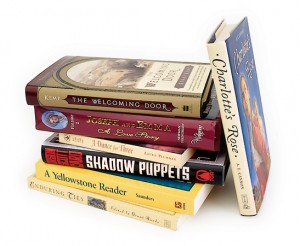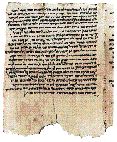Books by BYU alumni abound in the national and Latter-day Saint markets.
Maybe not everyone will agree with Anthony Trollope, the 19th-century English novelist, in his insistence that “book love . . . is your pass to the greatest, the purest, and the most perfect pleasure that God has prepared for His creatures”—after all, reality TV, movies, and NFL football hadn’t been invented. But I know that reading good books till my eyes hang out has enriched and expanded my life.
New books vie for our attention daily as writers undertake to satisfy the universal human desire to reach outside themselves for sympathy, to express adequately sincere, genuine, and typical human emotion—the essence of art. The number of books being produced by BYU alumni and faculty is impressive and of special interest to those of us who look at human life through lenses tinctured “Mormonly.” Six such recent books have graced the national market.

Grant R. Hardy, ’84, has compiled Enduring Ties: Poems of Family Relationships (Steerforth; 209 pp.; $14.95). Don’t skip, folks, because this is a poetry collection. This is the finest read-aloud-to-your-spouse collection of poetry about kith and kin I have run across; it’s a book that even the most assiduous nonreaders of poetry will thoroughly enjoy. There are ancient and contemporary poems—none of them by Latter-day Saints but all of them consistently uplifting, valuable, “of good report [and] praiseworthy” (A of F 13). These delightful short poems capture “glimpses of our most intimate and committed relationships, arranged as they might be encountered over the stages of a typical lifetime” (p. 1). Hardy, a professor of Asian history and chair of the history department at the University of North Carolina at Asheville, offers here moving but refreshingly unsentimental poems in “celebration of family life, an affirmation of the worth of those relationships in which we have invested so much of ourselves.” These poems, most of which you likely have never read before, are, writes Hardy, “the work of fine poets who . . . know both the strength and fragility of family ties; that joy and pleasure have to be set against the real possibility of disappointment and loss; and that an awareness of our vulnerability in these most intimate of bonds makes them all the more valuable” (p. 1).
Richard L. Saunders, ’92, has collected in A Yellowstone Reader: The National Park in Folklore, Popular Fiction, and Verse (U of U Press; 309 pp.; $17.95) a fascinating, entertaining, and unique visit to the mother of all national parks. Saunders provides Yellowstone excerpts ranging from a Victorian dime novel (Diamond Dirk; Or, The Mystery of the Yellowstone [1878]) to Yellowstone stories by Emerson Hough, Owen Wister, and BYU professor of English Douglas H. Thayer, ’55, (“Mr. Wahlquist in Yellowstone” [1987]) to selected Yellowstone folklore and poetry to a comprehensive annotated bibliography of Yellowstone fiction. If you love Yellowstone country, you’ll enjoy this volume.
Shadow Puppets (Tor; 348 pp.; $25.95), by Orson Scott Card, ’75, is the sequel to Ender’s Shadow. Card, a brilliant prober of the moral and ethical and master of what Publisher’s Weekly rightly calls “impeccable prose, fast pacing, and political intrigue,” leads readers on the further adventures of a now-mature Bean and Petra and the rest of Ender’s Dragon Army as they protect Peter Wiggin, Ender’s older brother and Hegemon, and move toward a showdown with the ruthless Achilles. I liked it, but I’m a Card fan.
Louise R. Plummer, BYU associate professor of English, in A Dance for Three (Laurel-Leaf/Random House; 230 pp.; $5.50), departs from her usual seriocomic young-adult fare to tell, from three perspectives, the powerful story of Hannah Ziebarth’s teenage pregnancy. It explores the loss, recovery, and self-discovery the pregnancy brings to Hannah—already overwhelmed by teenage woes—and her friends Trilby and Roman. This is a good book for juveniles and young adults.
Ann Edwards Cannon, ’78, in Charlotte’s Rose (Wendy Lamb; 246 pp; $15.95), tells the story of 12-year-old Charlotte’s 1856 journey from Wales to Zion. En route, the girl becomes the foster mother of an orphaned infant, an experience that changes, focuses, complicates, and enriches her young life. It’s a fine story for juveniles by a fine writer.
In a short, loose-jointed but well-written novel, Kenneth O. Kemp, ’80, gives new life to three of Jesus’ parables—the prodigal son, the talents, and the good Samaritan. In The Welcoming Door: Parables of the Carpenter (HarperSanFrancisco; 291 pp.; $18.95), a fictionalization of the life of Christ, Kemp imagines the young Jesus (Jeshua) coming of age as a carpenter and actually living the events that he later teaches as parables to his disciples. Kemp’s Jeshua doubts himself and experiences frustration and weariness but grows toward his destiny in embodying the traits of goodness, hard work, patience, love, mercy, and forgiveness. This is a worthwhile read for all ages.
Alumni authors have also kept local presses busy. Allen E. Bergin, ’56, BYU professor emeritus of psychology, has packed the essentials of his BYU psychology course, LDS Perspectives and Psychology, into a rich and useful volume, Eternal Values and Personal Growth: A Guide on Your Journey to Spiritual, Emotional, and Social Wellness (BYU Studies; 274 pp.; $27). Bergin’s text adds to biology and environment—the twin bases of secular theories of personality—the influence of premortal experience and divine influence during mortality. Discussing the forces and influences that shape us, Bergin underscores that the spiritual perspective frees us and makes us more receptive “to divine illumination about our circumstances and the alternatives before us with their diverse consequences” (p. 6). Bergin has written an inspiring, refreshingly practical, and motivational book designed to help Latter-day Saints grow spiritually, emotionally, and socially, harmonizing secular research with gospel principles and eternal values.
Now Marsha Dahl Newman, ’68, and Buddy Youngreen, ’64, in vol. 2 of Joseph and Emma: A Love Story (Wellspring; 460 pp.; $23.95), make vivid Emma Hale Smith’s hectic life as the wife of the Prophet Joseph Smith in this unique two-volume historical novel about Joseph and Emma Smith’s eventful marriage. Veteran novelist Newman and respected historian Youngreen, who is also founder and president of the Joseph Smith Sr. Family Organization, blend well- and lesser-known history with fiction to craft a fascinating account of how their life must have been during the events at Haun’s Mill and the arrest of Joseph and Hyrum Smith and Sidney Rigdon in Missouri. The novel refocuses attention on Joseph and Emma as a couple—on their enduring love affair, their trials and tensions, and on their tribulations—while attending to the demands and rapid growth of the fledgling Church. In this fresh and refreshing biography of the first couple, the reader comes to a new understanding of Emma’s and Joseph’s hard life, which must have made Joseph reflect, as he does just before his death in the book: “Joseph’s heart ached especially for Emma; the young girl he had spied through the trees along the Susquehanna River, so beautiful, so innocent! Wife of my youth! Have I failed you? Too often you suffered, because you chose me after God did” (p. 432).
Diane E. Wirth, ’60, in Parallels: Mesoamerican and Ancient Middle Eastern Traditions (Stonecliff; 211 pp.; $17.95) undertakes to document an extraordinary number of parallels among the myths and traditions that link Mesoamerica and the ancient Middle East (Hebraic, Egyptian, and Mesopotamian). Wirth’s scholarly yet very readable comparative analysis makes a convincing case for pre-Columbian transoceanic voyages and cultural influence in the peopling and settling of ancient America.
Richard Cracroft is BYU Nan Osmond Grass Professor of English, emeritus.
Related Article: More Cracroft Picks: A Quartet of Recent Novels








